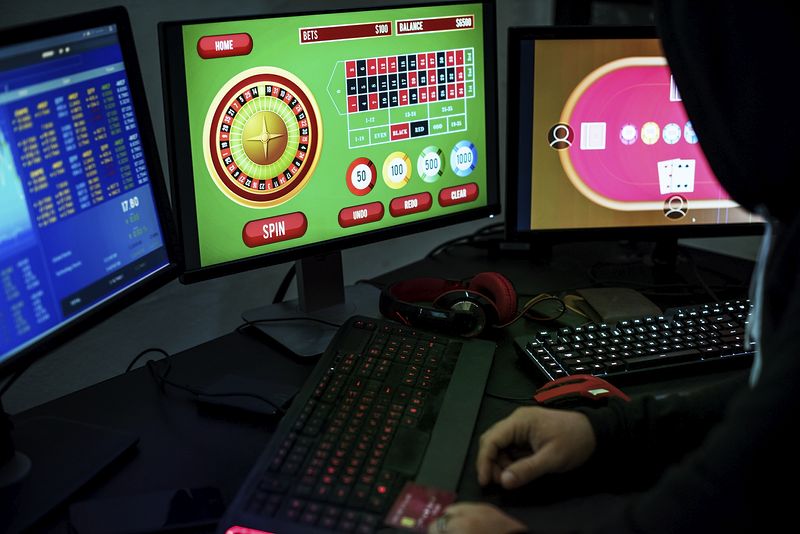Online poker gaming has pushed traditional players into learning new skills to adapt to the virtual environment. One of these skills is “bluffing” or deceiving opponents to gain an edge.
Online poker players are now faced with different challenges when it comes to bluffing as opposed to a live game. Here are some tips and strategies professional poker online players use to bluff effectively.

Pay Attention To History
Professional poker players understand that knowledge of poker history is critical to success when participating in poker tournaments. The most experienced poker players are skilled at poker and understand how each aspect of poker has evolved.
Therefore, an intelligent poker-playing strategy to bluff effectively is to pay special attention to poker history and use it as a valuable asset when playing in tournaments.
Online poker sites offer an excellent way for players to study the nuances of poker by providing an array of statistics and data on recent play patterns and results from those who have participated in poker tournaments worldwide.
This can be an excellent resource for someone looking to improve their game and increase their chances for success.
Use Check-Raise Bluffs
Check-raises are a powerful way for professional players to bluff, allowing players to maintain control of the pot as much as possible. In a typical bluff check-raise, a player would make a strong bet on the flop and then check on the turn. This move can manipulate the opponents into thinking they are getting good value by raising or betting.
As the aggressor, the opponent is placed in a difficult spot when the player checks on the turn, allowing them more control over what action follows. If called, this strategy typically gives better odds of success if the opponent has just an average hand.
With so many potential benefits, it’s no wonder why the best online poker players rely on check raises as one of their most potent bluffs.
Choose The Right Opponent
Professional bluffers understand the importance of carefully choosing their opponents when attempting to execute a successful bluff. A great poker player can read the opponent, further enabling them to decide whether or not they should employ a bluff strategically.
Opponents that are more reactive and less perceptive are typically easier targets for bluffs. Individual players who are more emotionally controlled and better tuned into the situation may require more aggressive strategies.
Knowing how an opponent plays allows a professional bluffer to condition the table environment, causing any attempted bluffs to gain psychological weight. Therefore, when executing an advanced bluff, professionals must consider the variable of an opponent’s playstyle variable to increase their chances of success.

Change Up The Bluffing Routine
While poker players must remain vigilant about their signals and try to stay consistent in their tactics, professionals understand that it’s crucial to alter things occasionally. An advanced way professionals can effectively sway poker games to their advantage is by changing up the bluffing routine.
What might have worked as an effective poker tactic at one table might not be so successful against different opponents. Poker players are more likely to get easily detected without variation in tactics.
Therefore, understanding and mastering these shifts in strategy can be the difference between succeeding or losing streak at poker games and an efficient way for professional poker players to maintain success.
Not Over-Bluffing
One of the most advanced ways of bluffing successfully is by not over-bluffing. This means knowing how far to push with a bluff and when to back off. When done correctly, this strategy can effectively neutralize an opponent without giving too much information about one’s desired outcome or intentions.
For those who can gauge when their opponents are the ones doing the bluffing, it is even more critical to not over-bluff as it avoids getting caught in a situation from which there is no way out. When executed perfectly, not over-bluffing allows for sophisticated manipulation that can be difficult for others to create counter strategies against.
Aware Of Position
It is an often overlooked skill, but being aware of the positions when bluffing can help professionals take their skills to the next level. By having a clear sense of where they (and their opponents) are in the hand, they can make bold moves that maximize their chances of success.
Bluffing with position awareness allows players to control the betting and force their opponents out when a pot could reach high levels.
Understanding positional play also helps professionals identify when opponents have substantial holdings, enabling them to fold weak hands without much risk. Being conscious of one’s positional advantages is essential for any player looking to improve at bluffing.
Not Afraid to Fold
Professionals attempting to bluff in poker aren’t afraid to back down when needed. Instead of forcing their hand and trying to convince others that they have a good hand even when they don’t, experienced players are prepared emotionally to fold if it looks like their opponent has them beaten.
They understand that savvy opponents will be watching for any bluffs, and alternatively, good bluffers know when they’re well served by laying down their cards instead of attempting to bluff and push through a weak play.
These professionals can best improve their game through practice and experience. Furthermore, they must trust that folding at the right time isn’t necessarily a sign of defeat but may be a much more sensible move than trying to get lucky with an ill-conceived move.

Conclusion
Advanced bluffing in professional poker requires understanding psychology, strategy, and position. It is not a one-size-fits-all approach, as each game and each opponent presents challenges and variables to consider. Professional poker players understand that the key to success lies in mastering these variables and knowing when to adjust their strategies.
By staying aware of opponents’ playstyles, changing up bluffs from time to time, not over-bluffing, having an awareness of position, and being willing to fold if needed, professionals and those aiming to be professionals can remain successful at the tables for extended periods.